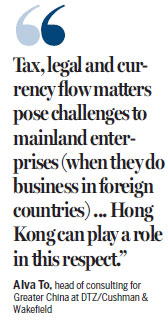Private firms set to gain from first mover SOEs
Updated: 2016-05-19 08:48
By Zhou Mo in Hong Kong(HK Edition)
|
|||||||
Private enterprises can take advantage of the platform created by State-owned enterprises (SOEs) and use their expertise to benefit from the Belt and Road (B&R) Initiative as the national strategy brings more opportunities in trade, finance, logistics and other sectors, according to an expert on projects related to the campaign.
The multinational initiative, proposed by President Xi Jinping in 2013, aims to strengthen international trade and economic cooperation by improving connectivity along the historical land and maritime Silk Roads. It covers more than 60 countries, with combined gross domestic product accounting for nearly a third of the world's total.
According to Alva To, head of consulting for Greater China at global real estate services provider DTZ/Cushman & Wakefield, compared with private enterprises, large SOEs own more resources and have greater bargaining power, and so were the first companies to "go out" to B&R econmies, especially underdeveloped nations in Africa and Central Asia. As a result, they are the first beneficiaries of land development and infrastructure building projects. According to To, about 70 percent of the development projects signed by his company in 2015 were launched by SOEs.
However, that does not mean that private enterprises have few opportunities along the B&R, he pointed out.
"Rather, private enterprises need to have a platform where they can give full play to their specific expertise. SOEs, by taking the first step in the process, create such a platform for them," he told China Daily.
As an example, To cites a cultural tourism project in Cambodia's famed Angkor Wat temple complex. The project was developed by Usunhome Culture Investment Group, a Chengdu-based company specializing in cultural tourism development and operation.
In 2014, DTZ/Cushman & Wakefield won the bid to provide a range of services for the project, including in-depth market research for large-scale cultural performance programs, tourism and vocational training in Cambodia, and analysis of a business model for Cambodia's cultural tourism industry.
Infrastructure in Cambodia has already been developed and the country has rich cultural resources, To noted. "Based on these, the (Chengdu-based) private firm was able to take advantage of its expertise in the tourism industry to develop related products in the Southeast Asian country and benefit from the initiative."
SOEs and private enterprises relate to two different stages of approaching a project. By starting the initial development, SOEs provide appropriate conditions for private enterprises to enter the markets, he explained.
While the initiative has created more business opportunities for Chinese mainland companies, there are also challenges.
"Tax, legal and currency flow matters pose challenges to mainland enterprises (when they do business in overseas markets)," To pointed out.
"Hong Kong can play a role in this respect. With its international experience and sound professional services, Hong Kong can help mainland enterprises 'go out'."
sally@chinadailyhk.com

(HK Edition 05/19/2016 page5)